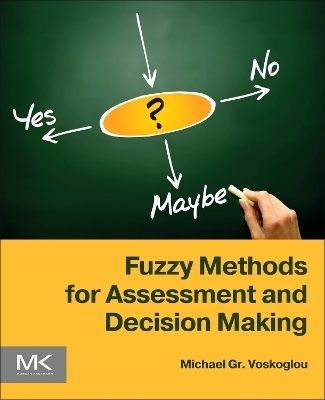
Fuzzy Methods for Assessment and Decision Making
Morgan Kaufmann Publishers In (Verlag)
978-0-443-23732-4 (ISBN)
The book presents innovative fuzzy assessment methods, enabling readers to assess the mean and quality performance of learning or problem-solving skills of a group of students when qualitative (linguistic) grades are used for this purpose. In the case of using linguistic grades for the assessment of a group’s skills, the classical method of calculating the mean value of the (numerical) grades cannot be applied. Also, no safe conclusions can be obtained on comparing the quality performance of two groups when the values of their GPA index are equal.
Dr. Michael Gr. Voskoglou is an Emeritus Professor of Mathematical Sciences at the School of Technological Applications of the Graduate Technological Educational Institute, University of Patras, Greece. He has also taught at the Hellenic Open University, at the Mathematics Department of the University of Patras, and at the Schools of Primary and Secondary In-Service Teachers Training in Patras. As a visiting Professor he has taught postgraduate courses at the School of Management at the University of Warsaw, at the Department of Operational Mathematics of the University of Applied Sciences in Berlin, and at the Mathematics Department of the National Institute of Technology of Durgapur under a grant of the GIAN program of the Indian Government. He also worked for three years under sabbatical as a visiting researcher in the Institute of Mathematics and Informatics of the Bulgarian Academy of Sciences in Sofia. He has authored/edited 18 scientific books and has published more than 550 papers in reputed journals and proceedings of conferences of many countries all around the world, with about 1800 citations from other researchers. He is also reviewer of the American Mathematical Society and member of the Editorial Board or referee in many international mathematical journals. His research interests include Algebra, Fuzzy Sets, Markov Chains, Artificial Intelligence, and Mathematics Education.
1. Introduction
2. Mathematical Background
3. The Rectangular Fuzzy Assessment Model (RFAM)
4. The Process of Learning
5. Problem Solving
6. A Hybrid Model for Assessing Learning and Problem Solving Skills with Qualitative Grades
7. Other Applications of Fuzzy Assessment
8. Fuzzy Decision Making
| Erscheinungsdatum | 15.10.2024 |
|---|---|
| Verlagsort | San Francisco |
| Sprache | englisch |
| Maße | 191 x 235 mm |
| Gewicht | 450 g |
| Themenwelt | Informatik ► Theorie / Studium ► Künstliche Intelligenz / Robotik |
| Mathematik / Informatik ► Mathematik ► Angewandte Mathematik | |
| Wirtschaft ► Betriebswirtschaft / Management ► Unternehmensführung / Management | |
| ISBN-10 | 0-443-23732-8 / 0443237328 |
| ISBN-13 | 978-0-443-23732-4 / 9780443237324 |
| Zustand | Neuware |
| Informationen gemäß Produktsicherheitsverordnung (GPSR) | |
| Haben Sie eine Frage zum Produkt? |
aus dem Bereich


